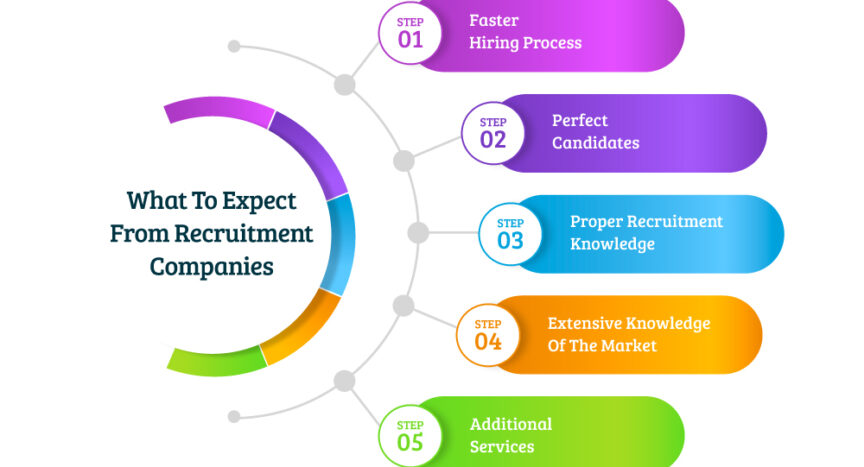A recruitment agency is a company that helps organizations find suitable candidates for open positions. They serve as intermediaries between job seekers and employers, assisting with job search, selection, and hiring processes.
25 Recruitment industry facts:
- The global recruitment industry is worth over $450 billion.
- In the US, the recruitment industry generates over $150 billion in annual revenue.
- Over 60% of companies use recruitment agencies to fill positions.
- Temporary and contract employment has been on the rise, accounting for a significant portion of agency revenue.
- The average time to fill a position is 42 days.
- The healthcare sector is the fastest-growing industry for recruitment agencies.
- The average cost-per-hire is approximately $4,000.
- 75% of candidates are passive job seekers.
- Companies that use recruitment agencies typically receive a 3-to-1 return on investment.
- Over 50% of job seekers use mobile devices for job searching.
- Employee referrals are the top source of quality hires.
- Job boards account for 20% of external hires.
- LinkedIn is the most popular platform for professional networking and job searching.
- Social media recruiting has become increasingly important, with 92% of companies using it for hiring.
- Recruitment agencies often specialize in specific industries or niche markets.
- Executive search firms focus on recruiting for senior-level positions.
- The average employee turnover rate is around 15% per year.
- Retention is a critical concern for employers, with 87% prioritizing employee engagement.
- Over 70% of organizations use applicant tracking systems (ATS) to manage the hiring process.
- Video interviews have become more common due to technological advancements and remote work.
- AI and machine learning are increasingly being used in the recruitment process.
- The gig economy has led to an increase in freelance and contract work opportunities.
- Diversity and inclusion are important considerations in the hiring process, with 67% of job seekers considering it when evaluating job offers.
- Soft skills are highly valued by employers, with communication, teamwork, and adaptability being the most sought after.
- The COVID-19 pandemic has had a significant impact on the recruitment industry, accelerating the shift towards remote work and digital hiring processes.
Benefits of using a recruitment agency:
- Time-saving: Recruitment agencies handle the entire hiring process, allowing businesses to focus on their core operations.
- Access to a vast pool of candidates: Agencies have access to numerous candidates with different skill sets and experiences.
- Expertise: Recruitment agencies specialize in hiring and have a deep understanding of market trends and industry requirements.
- Cost-effective: Outsourcing the recruitment process can be more cost-effective than hiring in-house.
- Confidentiality: Recruitment agencies maintain confidentiality, protecting both the employer and job seeker.
10 simple steps to understand the key aspects of the recruitment process:
Step 1 – Business Development: Find companies that need help hiring new employees and convince them to work with your recruitment agency.
Step 2 – Client Requirements – Take a Comprehensive Job Spec: Talk to the company to understand the job they need to fill, including the skills and experience required.
Step 3 – Get terms of business signed: Agree on the terms of your service, including fees and the recruitment process, and get a signed contract.
Step 4 – Search Strategy: Find the best ways to search for suitable candidates, like job boards, social media, and referrals.
Step 5 – Shortlist of candidates: Select the top candidates who match the job requirements and present them to the company.
Step 6 – Interview Stage: Help the company interview the candidates to find the
best fit for the job.
Step 7 – Offer stage: Once the company decides on their preferred candidate, help them make a job offer with the right salary and benefits.
Step 8 – Notice Period: Assist the candidate in managing their notice period with their current employer before starting the new job.
Step 9 – Getting Paid: Once the candidate starts their new job, invoice the company for your recruitment services according to the agreed terms.
Step 10 – Referrals: Ask the company and the candidate for referrals to help grow your recruitment agency business.
10 steps to starting your recruitment agency business:
Step 1 – Choosing your industry: Select a niche market to specialize in. Some examples include:
- Healthcare
- Information Technology
- Finance
- Engineering
- Education
- Sales and Marketing
- Construction
- Executive Search
- Human Resources
- Manufacturing
- Hospitality
- Retail
- Legal
- Creative and Design
- Non-profit
Registered Nurse Niche Staffing Agency Business
IT Project Management Niche Staffing Agency Business
Cannabis / Medical Marijuana Niche Staffing Agency Business
Java Software Niche Staffing Agency Business
Mechanical Engineer Niche Staffing Agency Business
Digital Marketing Niche Staffing Agency Business
Cyber Security Niche Staffing Agency Business
Front End/UI Niche Staffing Agency Business
Embedded Software Niche Staffing Agency Business
.Net Developer Niche Staffing Agency Business
Sales & Business Development Niche Staffing Agency Business
Medical Sales
Choose the Right Niche
Building a staffing agency begins with choosing the right niche to specialize in.
Sounds baffling? It doesn’t need to be! Here are 3 strategies to get your first round of recruits and cash flow:
- If you have any experience in a particular field, use your connections to source people and job positions.
- Check out some job boards and see if you notice any recurring themes, jobs or industries that seem to need a lot of the same thing, for example, retail workers being in high demand around the holiday season.
- Think about the supply and demand cycles of the industry you choose.
- Supply and demand at a local level: look into the job types available in your area and what the potential demand for labor supply is as you will need temporary staffing agency (heads up: temp agencies are super easy to find online) and clients to succeed.
- Look at niches within a field: for example, there are a whole range of niches within office administration, such as mid-level administrative support staff to Fortune 500, light industrial work admin, or admin for lone workers.
- Background experience: if you have a background and expertise in a specific field, it’ll be easier for you to easily assess candidates for jobs in that specific field and even adds more credibility to your company. For example, only looking for the most experienced retail workers.
Once you choose the right niche, you can get into the real work of building a staffing agency.
Two things to remember here:
- Supply and demand are ever-changing (as the pandemic showed us!) Be prepared to switch up your business model and don’t focus on just one industry – be flexible. You never know when a slump could happen so it might be wise to test out some niche service offerings.
- Your recruits will likely be signing up to several job agencies, as their end goal is to land a job, not be loyal to a certain brand. You need to go above and beyond to make it clear what added value you can bring to them (such as excellent, responsive communication, or having seamless organizational skills and scheduling).
Action items:
- Do research into the correct niche to go into for your staffing agency. Check out local job boards, use your existing connections, and think about the value you can bring to both your recruits and clients.
Step 2 – Company name & Brand: Choose a unique and memorable name for your recruitment agency and create a strong brand image.
Step 3 – Registering the company: Register your recruitment agency as a legal business entity in your country, following the necessary regulations and guidelines.
Know Your Startup Costs
The basic principle of keeping your business costs low and your profits high is one of the most important things when you want to start a staffing agency. And, once you know which niche you’ll target, rounding up the initial costs becomes easier.
Typically, startup costs range from $60,000 to $130,000. Depending on your location, size, and if you need an office, the costs vary.
Action items:
- You’ll need to look into the following costs as a baseline:
- Office (rent)
- Insurance
- Legal setup fees
- Website development
- Software such as payroll, HR, training, etc. (Connecteam’s employee app offers all this, and all for free: learn more here)
- Other office needs, such as supplies
- Wages (part-time or full-time staff)
- Advertising and marketing
Step 4 – Creating Website/Logo: Design a professional logo and create a user-friendly website to showcase your services and attract potential clients.
Step 5 – Social Media Platforms: Create accounts on relevant social media platforms to promote your business and connect with potential clients and candidates.
Step 6 – Choosing your accountant: Hire an accountant to manage your business finances and ensure compliance with tax and financial regulations.
Step 7 – Data protection: Implement data protection policies and procedures to safeguard the personal information of clients and candidates.
Step 8 – Business Insurance: Obtain the necessary business insurance to protect your recruitment agency from potential risks and liabilities.
Take Out Insurance
Insurance is absolutely essential for staffing agencies and is a step that cannot be overlooked when starting a staffing agency. Since we’re not insurance experts, unless you are, it’s best to consult an insurance agent who understands the industry to ensure your company is covered.
Some common insurance examples include:
- Business owners policy
- Commercial general liability insurance
- Employee theft and crime coverage
- Employment practices liability insurance
- Key employee insurance
- Liability insurance
- Workers’ compensation
- Property coverage
- Umbrella policies
- Business auto insurance (if you have a company car)
Not all of these insurance policies will be relevant to your staffing agency, but depending on your niche, you’ll likely need some form of insurance, if not several!
Step 9 – Recruitment Databases: Invest in a recruitment database or applicant tracking system to manage candidate profiles and streamline the hiring process.
Hire The Right People
Enter: Connecteam. It’s the all-in-one employee management app that gives you total control and helps streamline your daily business operations.
Here’s what Connecteam can do for you when starting a staffing agency:
- Provide you with efficient job scheduling and real-time availability regarding your employees’ schedules. That means you get to keep on top of the schedule, and assign shifts based on various requirements, as well as provide relevant information including time, address, and special instructions, allow employees to accept and reject shifts, and more.
- Get automatic notifications whenever an employee clocks into their shift, rejects the shift, or doesn’t show up at all. Remember, your reputation is one of the most important aspects of all when you open a staffing agency!
- Get to-the-second reports of the hours your employees have worked, meaning there’s no chance for any payroll errors to slip by you: you’ll pay employees (and charge your clients) according to their clock-ins and clock-outs. Also, Connecteam integration with QuickBooks Online and Gusto ensures 100% accurate payroll.
- Keep all of your business information (client information, needs and more, as well as employees’ information and documentation, such as employee benefits) in one place, and at the click of a button. That means happy clients and happy employees, which is one of the most important aspects when you’re working out how to open a staffing agency successfully from the get-go!
- Automate annoying admin: Connecteam’s checklists and forms makes it quick and easy to improve response times and processes, such as expense reporting, reimbursement, equipment checks, and more.
- Ensure compliance and sign contracts through digital ‘read-and-sign’ forms, such as policies and procedures, uniform and dress code, and more.
And there are about a dozen more features designed to help your staffing company function perfectly across processes, clients, and employees, but the best part about Connecteam is that there’s no extra training required, it is super affordable and can be rolled out in under 2 minutes.
Knowing how to start a staffing agency is one thing but knowing who your company is and what it stands for can make all the difference in hiring a good employee, and having to manage a difficult employee.
Look for skills and characteristics like:
- Is professional, well-spoken, presentable, and calm
- Has innovative ideas
- Has problem-solving skills
- Is ambitious
- Has ideas on how to improve their skills and daily tasks
- Is capable of conflict resolution
- Is dependable
- Is creative
- Has a positive attitude
Step 10 – Managing your recruitment desk/ Conclusion: Organize your workspace and develop a daily routine to manage your recruitment agency effectively. Stay informed about industry trends and continuously improve your services to ensure long-term success.





